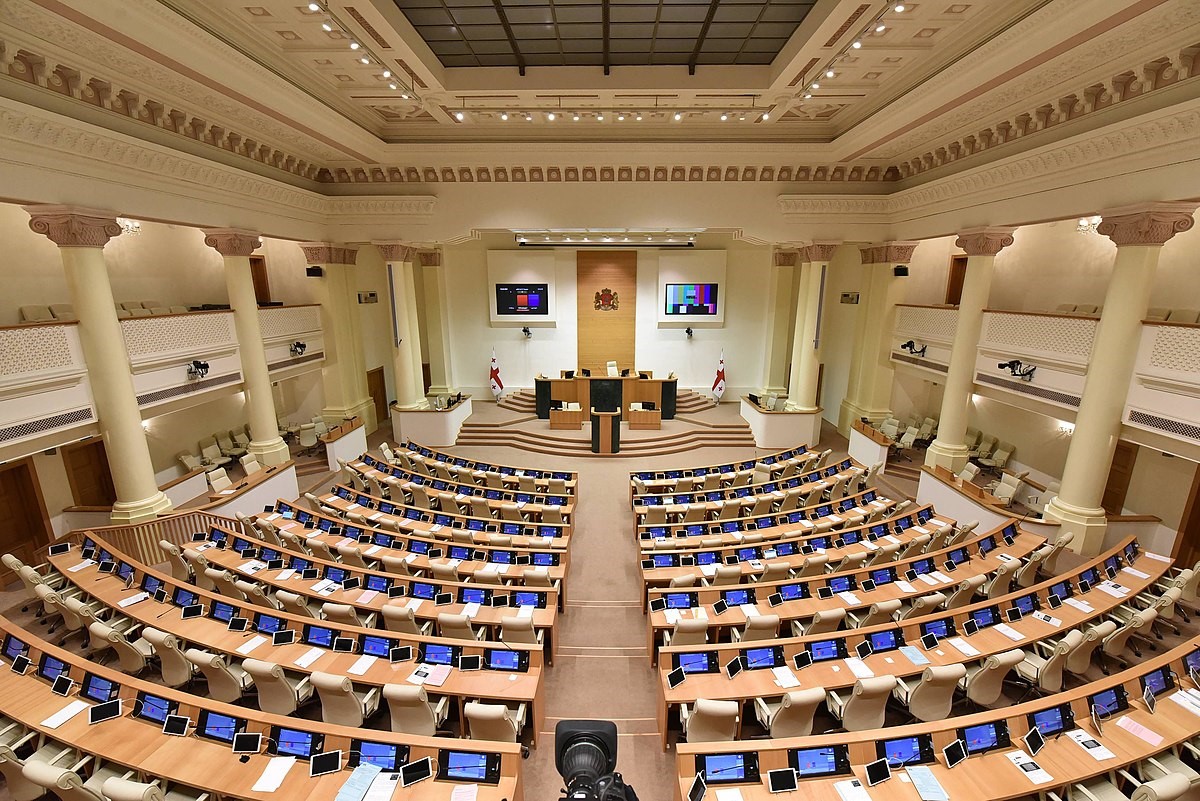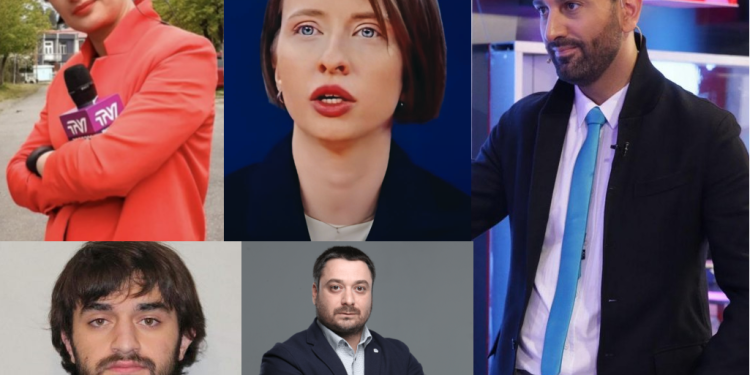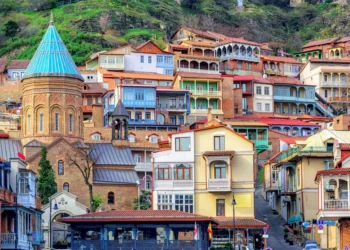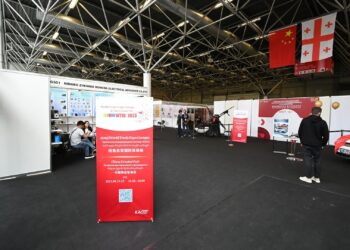Critical Journalists and Media Outlets Assaulted, Ambushed, Raided
A series of recent attacks, ambush and raids has affected journalists and media outlets critical of the Georgian Dream government and the Law “on transparency of foreign influence”. The perpetrators and the motives remain mostly unknown. On 24 March 2024, unknown individuals broke into the house of the TV Pirveli journalist Nato Gogelia in Ozurgeti and damaged her belongings. Gogelia wrote on social media that her house had been raided twice before in February 2024. She established a link with her journalistic activity and termed the raids attempts to intimidate and silence her. “Impunity for crimes against journalists leads to increased violence against them”, the Georgian Charter of Journalistic Ethics wrote in a statement, urging prompt and efficient investigation into the crime. Police opened an investigation on charges of ‘theft’. On 22 April, Ia Sartania, a journalist with Formula TV, was assaulted at a tube station in Tbilisi. She reported that a man approached her from behind, pushed her, swore at her, using homophobic language. She noted that she could have been identifiable as a Formula TV journalist as she was carrying a bag with the outlet logo. The police later detained and charged a suspect with an administrative offence. On 7 May, a Formula TV crew, including a camera operator and a driver, and Giorgi Kldiashvili, the director of the Institute for Development of Freedom of Information (IDFI), were attacked near the Embassy of Sweden in Tbilisi. Footage published by Formula TV shows Rezo Vashakmadze, who has donated to the Georgian Dream party in recent years, pointing a bottle at Kldiashvili and the crew, swearing at them, and assaulting them. The Public Defender (Ombudsman) called on law enforcement agencies to investigate the incident. On 10 May, Nodar Meladze, news director at TV Pirveli, reported that two suspicious cars with masked individuals had been observed at the newsroom’s entrance and in its yard the night before. Meladze said these individuals posed a potential threat to the staff of the outlet and to their guests. On the evening of 9 May, several protesters against the bill “on transparency of foreign influence”, including some who had given interviews in the TV Pirveli studios, had been assaulted by masked individuals. Meladze said he made five calls to 112, and after the police did not arrive, contacted Keti Kovziashvili, the head of the strategic communications department at the Ministry of Internal Affairs. On 16 May, late at night, an unknown person attacked Giorgi Badridze, a reporter for the news website Tabula, on his way home. Badridze told the online news outlet Media Checker that he was hit without any warning. He sought help from a passing driver and called the patrol police. The incident was reported to the Special Investigative Services.
Reply from the authorities:
Information by the Prosecution Service of Georgia regarding alert N115-2024 published on
the Platform to Promote the Protection of Journalism and Safety of Journalists
The investigation conducted in the case established that on May 7, 2024, Giorgi Kldiashvili, director of the
Institute for the Development of Freedom of Information, was present at the meeting at the Embassy of Sweden
located on N.Kipshidze Street, Tbilisi. After leaving the embassy, Giorgi Kldiashvili gave an interview to the
journalists of the “Formula” and “Rustavi 2” TV channels. Revaz Vashakmadze was driving by at the specified
time and was frustrated by the fact that Giorgi Kldiashvili and journalists, people at that time unknown to him,
were occupying the part of the roadway that was impeding his movement. He swore at them and parked near
his house. After Giorgi Kldiashvili heard Revaz Vashakmadze’s swearing, there was a violent confrontation.
They were kept apart by people passing by, including journalists, while they physically and verbally abused
each other.
Thus, it was established through an overall examination of the evidence obtained for the case that the offence
was committed under Article 126 (1) not Article 154 (1) of the Georgia Criminal Code. Therefore, the case was
requalified, and on June 5, 2024, Revaz Vashakmadze was accused under Article 126(1) of the Criminal Code.
On July 9, 2024, the criminal case was sent to the Tbilisi City Court for a hearing.
Parliament Bans Accredited Journalists and Online Media Amid Debate on ‘Foreign Agents’ Bill

On 8 April 2024, accredited journalists with some media outlets were denied access to Parliament building without explanation, while the bureau of the institution was assessing registration of the draft Bill “on Transparency of Foreign Influence”. “We have been trying to contact the Parliament press office since morning. We’re still awaiting their explanation as to why the entry is being denied despite us holding special permits”, said Lika Zakashvili, editor-in-chief of the outlet Publika. The Media Advocacy Coalition, which unites 16 human rights and press freedom advocacy organisations, emphasized the societal interest in the bill and stated that Parliament’s refusal to grant media access deprives the Georgian society of the possibility to receive information and participate in the democratic process. The Coalition urged the Speaker of Parliament, Shalva Papuashvili, to ensure fair working conditions for media representatives. On 14 April, the Speaker issued regulations to enhance safety measures, which banned accredited journalists with online media outlets from accessing Parliament on the next day. Under the yellow security level determined on 15 April, only accredited journalists with TV broadcasters were granted access to the premises, thus excluding journalists with online media from reporting on the debate on the Bill in the Legal Issues Committee. The decision was renewed on 28 May, and only TV crews were granted access to Parliament during the debate on the President’s veto on the adopted Law. The Georgian Charter of Journalistic Ethics called on Parliament to respect the right of the public to be informed, to refuse what it termed discriminatory practices against online media outlets and to ensure working conditions that enable journalists to perform their professional duties.
Reply from the authorities:
Media Alert No. 114/2024
“Parliament Bans Accredited Journalists and Online Media Amid Debate on ‘Foreign Agents’ Bill”
Reply 1 of the Parliament of Georgia
Temporary Restrictions
Violent demonstration in front of the Parliament and the picketing/blocking of its venue by
demonstrators in April/May 2024 caused physical destruction/damage of parliamentary premises as
well as threat to life and health of parliamentary staffers, MPs and representatives of law enforcement
bodies. Moreover, in previous occasions, instead of providing journalistic coverage, some media
representatives went beyond their journalistic responsibility and held demonstrations/protests in the
parliamentary venues, blocked parliamentary meeting rooms and significantly hindered Parliament’s
functioning.
It was with this background that the Parliament was forced to strengthen its security (by issuing
stronger security alerts) during parliamentary deliberations on the Law on Transparency of Foreign
Influence, and allowed only accredited TV media (in total – 17 media with 44-46 journalists/operators)
in the building of the Parliament during 16 days in April/May (see Annex). The Parliament continued
its broadcasting of all meetings of bureau, committees and plenaries via its dedicated Parliamentary
Channel, its website, Youtube and social media channels. Everybody thus had an access to the
parliamentary discussions.
As a result, these measures:
(A) Allowed effective functioning of the Parliament.
(B) Averted danger to life and health of parliamentary staffers and MPs.
(C) Ensured the possibility of interested citizens and the general public to receive information
on the parliamentary business.
The Parliament of Georgia continued its functioning without restrictions in all other days.
Statistics
As of 6 June 2024, accreditation was granted to 625 journalist in 2023-2024, including:
– 286 in 2023.
– 339 in 2024.
There were 22,839 entrances of journalists throughout 2023-2024. Out of 22,839 entrances, journalists
violated the media accreditation rules and got their accreditation suspended 14 times (0,06%).
(Annex)
Special Investigation Service
(TV „Pirveli“ Episode)
The investigation is underway in the East Georgia 2nd Unit of the Investigation Department of the Special
Investigation Service on a criminal case, on the facts of unlawfully interfering with TV „Pirveli“employees’
professional activities, with the signs of the crime under Article 154 of the Criminal Code of Georgia.
The investigation was launched based on the information spread in the mass media on May 10, 2024, stating
that employees of the “Pirveli” TV station in Tbilisi, Georgia, saw unidentified individuals sitting in two cars
and wearing masks near #13a Tbel Abuseridze Street. The TV company representatives emphasised that the
conduct of the unidentified people there could have put the lives and health of the company’s journalists in
danger and linked their presence with their journalistic activities.
From May 10 until today, a number of procedural and investigative procedures were carried out in the
mentioned criminal case, including interviewing 4 journalists of TV “Pirveli” Company, namely: 1) Nodar
Meladze; 2) Maka Andronikashvili; 3) Maka Chikhladze; and 4) Tamta Dolenjashvili.
As of today, the investigation into the criminal case is ongoing, and no summary decision has been made at
this stage. All necessary investigative and procedural activities will be carried out to ensure an objective,
thorough, and comprehensive investigation.
(Journalist Giorgi Badridze Episode)
The investigation was launched on May 13, 2024, and is underway in the East Georgia 2nd Unit of the
Investigation Department of the Special Investigation Service on a criminal case, on the facts of unlawfully
interfering with the journalist’s professional activities, with the signs of the crime under Article 154 of the
Criminal Code of Georgia.
The Special Investigation Service also received a report from “Tabula” journalist Giorgi Badridze on May 17,
2024, which was attached to the same criminal case. The report alleged physical aggression against Badridze
and was linked to his professional activities.
A summary decision has not yet been delivered and no one is identified as a victim or an accused in the case.
The investigation into the criminal case is ongoing and all necessary investigative and procedural activities
will be carried out to ensure an objective, thorough, and comprehensive investigation.
(Giorgi Kldiashvili Episode)
The investigation was conducted in the East Georgia 3rd Unit of the Investigation Department of the Special
Investigation Service on a criminal case, on the facts of citizen Revaz Vashakmadze physically abusing
Giorgi Kldiashvili, with the signs of the crime under Article 126(1) of the Criminal Code of Georgia.
On May 7, 2024, the first division of the Vake-Saburtalo main division of the Tbilisi Police Department of
the Ministry of Internal Affairs launched an investigation into the aforementioned criminal case under the
first section of Article 126 of the Criminal Code. However, on the same day, the qualification of the case
was changed under Article 154(1) (unlawfully interfering with the journalist’s professional activities) of
the Criminal Code, and according to the investigative jurisdiction, it was handed over to the Special
Investigation Service for further investigation.
On 7 May, a Formula TV crew, including a camera operator and a driver, and Giorgi Kldiashvili, the
director of the Institute for Development of Freedom of Information (IDFI), were attacked near the
Embassy of Sweden in Tbilisi.
The investigation conducted in the case established that on May 7, 2024, Giorgi Kldiashvili, director of the
Institute for the Development of Freedom of Information, was present at the meeting at the Embassy of
Sweden located on N.Kipshidze Street, Tbilisi. After leaving the embassy, Giorgi Kldiashvili gave an
interview to the journalists of the “Formula” and “Rustavi 2” TV channels. Revaz Vashakmadze was driving
by at the specified time and was frustrated by the fact that Giorgi Kldiashvili and journalists, people at that
time unknown to him, were occupying the part of the roadway that was impeding his movement. He swore
at them and parked near his house. After Giorgi Kldiashvili heard Revaz Vashakmadze’s swearing, there
was a violent confrontation. They were kept apart by people passing by, including journalists, while they
physically and verbally abused each other.
Thus, it was established through an overall examination of the evidence obtained for the case that the
offence was committed under Article 126 (1) not Article 154 (1) of the Georgia Criminal Code. Therefore,
the case was requalified, and on June 5, 2024, Revaz Vashakmadze was accused under Article 126(1) of the
Criminal Code. On July 9, 2024, the criminal case was sent to the Tbilisi City Court for a hearing.
1
Statistical Data
On which days were the restrictions in force?
In 2024, during the consideration of the draft law “On Transparency of
Foreign Influence”, the restricted regime declared by the Parliament of
Georgia during additional security measures was in force on the following
days:
April 15 – A yellow security level was declared
The restriction did not affect accredited journalists of TV broadcasters/TVmedia outlets.
April 16 – A yellow security level was declared
The restriction did not affect accredited journalists of TV broadcasters/TVmedia outlets.
April 17 – A yellow security level was declared
The restriction did not affect accredited journalists of TV broadcasters/TVmedia outlets.
April 18 – A yellow security level was declared
The restriction did not affect accredited journalists of TV broadcasters/TVmedia outlets.
April 19 – A yellow security level was declared
The restriction did not affect accredited journalists of TV broadcasters/TVmedia outlets.
April 29 – A yellow security level was declared
No more than two accredited groups of TV broadcasters/telemedia outlets
from each broadcaster were allowed to enter the building.
2
April 30 – A yellow security level was declared
No more than two accredited groups of TV broadcasters/telemedia outlets
from each broadcaster were allowed to enter the building.
May 1 – A yellow security level was declared
No more than two accredited groups of TV broadcasters/TV-media outlets
from each broadcaster were allowed to enter the building.
May 1 from 23:00 o’clock – A red security level was declared
The access to the building for the media representatives was restricted.
May 3 – A yellow security level was declared
The access to the building for the media representatives was restricted.
May 4 – A yellow security level was declared
The access to the building for the media representatives was restricted.
May 11 – A yellow security level was declared
The access to the building for the media representatives was restricted.
May 12 – A yellow security level was declared
The access to the building for the media representatives was restricted.
May 13 – A yellow security level was declared
No more than two accredited groups of TV broadcasters/TV-media outlets
from each broadcaster were allowed to enter the building.
May 14 – A red security level was declared
The access to the building for the media representatives was restricted.
May 27 – A yellow security level was declared
No more than two accredited groups of TV broadcasters/TV-media outlets
from each broadcaster were allowed to enter the building.
3
🔹 How many national broadcasters were allowed?
During the mentioned period, all accredited TV-media outlets had access to
the Parliament building:
1. “Imedi”
2. First Channel
3. “Rustavi-2”
4. “PosTV”
5. “Mtavari Channel”
6. “Pirveli”
7. “Formula”
8. “Maestro”
9. Adjara TV
10. Palitra News
11. Euronews Georgia
12. BMG
13. Alt-Info
14. TV company “Free Channel”
15. Broadcaster BBC
16. TV company “Kavkasia”
17. TV company “Obiektivi”
During the consideration of the draft law “On transparency of foreign
influence”, the restricted regime declared by the Parliament of Georgia
during additional security measures was in force for 16 days. During this
period, 17 TV-media outlets had access to the building (22-23 journalists per
day, the same number of operators).














